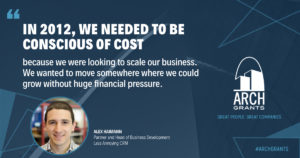
Recapping the Web: “I moved from a big city to a smaller one — and learned being a big fish in a small pond is way better for your career.”
St. Louis entrepreneur Alex Haimann, partner and head of business development at Less Annoying CRM, made a bold move when he left a good job in Washington D.C. for a full-time MBA program in St. Louis. “I was working at the Smithsonian National Postal Museum as a collections specialist when I was accepted, but I took the plunge, quit my job, and moved,” says Haimann. His article “I moved from a big city to a smaller one — and learned being a big fish in a small pond is way better for your career” for Business Insider explores the benefits he’s experienced by taking a leap of faith, leaving a metropolitan city and landing in the Midwest.
Haimann’s article shows that even mid-tier cities like St. Louis and Kansas City, Missouri, Huntsville, Alabama and Albany, NY may have more space for opportunity and growth than big cities like San Francisco or New York. There’s something about a small town that helps people like Haimann find room to spread their wings a little wider to find upper mobility as opposed to fighting for air space.
While metropolitan areas will still have advantages like location, education and history, Haimann shows that advantages like cheaper cost of living and therefore an ability to grow savings and a general easier access to the whole city with shorter commutes go a long way to bridge the gap between the big vs. small city, but there he cites three more specific job-growth related advantages that most big cities just can’t compete with, with the top one being networking in a more down-to-earth way.
NETWORKING “In St. Louis, I’ve been able to engage with others in a far more authentic way than I did in any setting in D.C. […] Organizations such as f.ounders, Summit, and Dialog center around cultivating small, close-knit communities of like-minded people. And in a smaller city, that describes just about every networking event you come across,” Haimman writes.
DESIRE TO RETAIN TALENT The next is that smaller cities understand the importance of keeping young talent in the area, so companies are willing to do what it takes to attract or keep the talent in their employment, allowing professionals easier mobility to advance or even to change employers.
PARTICIPATION ON AN ORGANIZATIONAL BOARD And finally, Haimann points to the importance of getting to meet senior leaders in a community and the ease at which one can do that by working with them as a member of an organization’s board. While that may be next to impossible in a metropolitan area, moving from volunteering to sitting on a board in a mid-sized city can happen faster than one might imagine.





